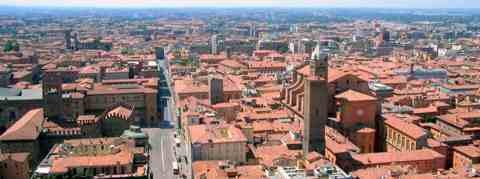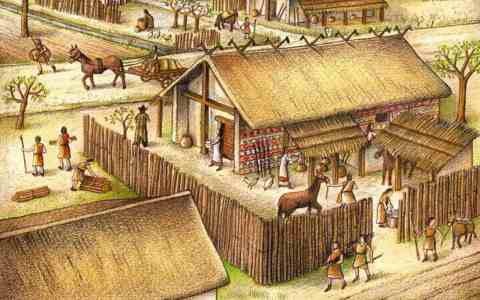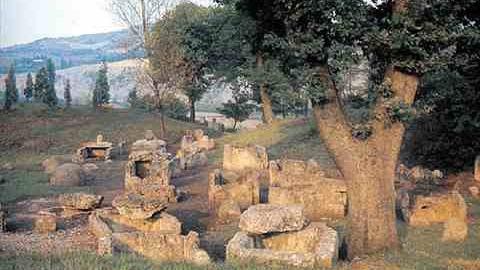HISTORY OF BOLOGNA
From the origins of Bologna to ...

The story would start like this: at the beginning VELZNA was the name of this location, then become FELSINA then finally with the Romans BONONIA -BOLOGNA, the name by which we know it today.
But it is already in the early iron age that the area will be of great interest to historians and archaeologists is a locality of allestree, Villanova, near Bologna, which gives its name to the first known civilization: the Villanovan.
The Etruscan town - Velzna
Subsequently the Etruscan period what has left important vestiges, mainly Misa or Misano (Marzabotto) Etruscan outpost for trading with the plain on which the archaeological site is one of the many reasons to visit the province of Bologna.
Important vestiges of Etruscan world are also stored in the same Museum P. Aria of Marzabotto and in the Archaeological Museum of Bologna.
Da Velzna a Bononia

The word VELZNA or FELZNA was pronounced by the Latin Felsina and as such the city was called by the Romans, at least until it remained in Etruscan hands and that is until it was conquered by the Gauls Boi in 358 a. C.
In 159 a .C. the Romans conquered it and renamed it Bononia (which later became Bologna in Italian), which seems to derive from the Celtic word bona ("fortified place"),
But the old name Felsina remained in common language and is still used today in Italian, also as an adjective, as a synonym for Bologna.
The origin of the "Studium"
The territory of Bologna was inhabited as early as the ninth century b.C. from the Villanovian civilization, as evidenced by the findings made in the area. Later, in the seventh and sixth centuries, the Etruscans founded a city called Felsina, with a complex urban structure, probably composed of stone buildings constructed around internal courtyards. Between the 5th and 4th centuries, with the arrival of the Gauls in the Italian peninsula, Felsina was conquered by the tribe of the Boi Gauls, definitively defeated in 196 b.C. by Roman troops and a few years later by Publius Cornelius Scipio. It was during this period that the city became a Roman colony and took the name of Bononia. Later, during the time of Augustus, the city experienced a period of strong development that led to the construction of paved roads, aqueducts, public buildings and thermae. Like other cities that stood on the Via Emilia, Bologna was also sacked and partially destroyed by the barbarians until, in 476, the Western Roman Empire fell permanently. In 727 Bologna was conquered by Liutprando, king of the Longobardi, until it was freed by Charlemagne and returned to the Church, to become part of the Kingdom of Italy at the end of the ninth century. Between the tenth and eleventh centuries, with the investiture struggles (clashes between the Papacy and the Empire), the influence of Countess Matilda of Canossa was felt, sided by the part of the Church. It was at this time that the Studium was born, the University of Bologna, which attracted students from all over the world, especially from Germany.
Bologna, the city of the tours
On the death of the Countess Matilda, in 1115, the birth of the Municipality, composed mainly of jurists, dates back.
In these years Bologna experienced a period of expansion towards the territories of neighboring cities, with the consequent spread of towers and tower-houses.
During the wars between the Guelphs and the Ghibellines, the city experienced alternating fortunes, with consequent revolts that risked emptying the city. In 1401, among the noble families of Bologna, that of Bentivoglio emerges, who will govern the city for 46 years, bringing a period of stability and economic and cultural growth: in this period the Palazzo Pubblico, the Palazzo del Podestà and Porta Ravegnana are restored.
After the banishment of the Bentivoglio family, Bologna became part of the Church for about three centuries.
From Napoleon to nowaday
In 1796 Napoleon arrived in Bologna, declaring the government of the Church lapsed and giving back power to the Senate after centuries, but after the Congress of Vienna in 1815, the city returned under the control of the Papacy until it was annexed in 1860 to the Kingdom of Sardinia, which will become the Kingdom of Italy exactly one year later.
The early 1900s saw a series of riots, demonstrations and attacks against Fascism, until the assassination attempt against Mussolini, in 1926.
Important the role of Bologna during the Second World War: being in a strategic position, the city was repeatedly bombed. The resistance of the partisans was strong, who suffered serious losses in these areas, especially in Marzabotto and during the battle of Porta Lame.
The '70s were the Years of Lead, characterized by attacks and political massacres, among these we must remember that of August 2, 1980 in Bologna, when a bomb explodes in the waiting room of the railway station, causing the death of 85 people and wounding of over 200.
